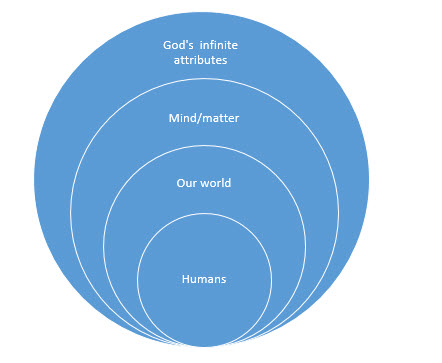Hence, they consider all natural things as a means to their own advantage. And knowing that they had found these means, not provided them for themselves, they had reason to believe that there was someone else who had prepared those means for their use. For after they considered things as means, they could not believe that the things had made themselves; but from the means they were accustomed to prepare for themselves, they had to infer that there was a ruler, or a number of rulers, of Nature, endowed with human freedom, who had taken care of all things for them, and made all things for their use. (Spinoza, 1994a, p. 26)
Spinoza critiques teleological modes of thinking in his Appendix to his first chapter; he is critical of humans positing “final causes” to events and Nature. He points out in the above quote that this teleological way of thinking necessarily leads to people viewing the world as a “means” to end; a final salvation. As Spinoza shows in the rest of the Appendix, this teleological approach has permeated our culture: when we think in this way, in terms of doing things because our reward will be in heaven, we cease to conceive of God’s immanence, but instead see our lives as a “means to an end” to attain salvation. This critique applicable to education; when we see learning as a means to an end – to achieve an external reward such as an exam grade – we cease to think immanently about our learning. Our educational experiences become a means to an end, and not intrinsically enjoyable in themselves. A whole raft of educational thinkers from Matthew Arnold to Chris Watkins have been highly critical of this perception of learning. As Watkins points out when learning becomes a means to an end, it becomes a “performance” (Watkins, 2003, p. 20); this, in turn, means that learning becomes side-lined in favour of a performance which looks like learning. As a result, students become obsessed with achieving external ratification for their effort, and cease to think meaningful about what they are learning (Watkins, 2010, p. 3). This is what I would like to term a “teleological” approach to education; learning is about the “final cause” – the external reward of achieving an exam grade – as opposed an “immanent” approach which views learning as intrinsically worthwhile in itself. As Spinoza points out one of the problems of this teleological perception of the world is that it “takes away from God’s perfection. For if God acts for the sake of an end, he necessarily wants something which he lacks.” This critique could be directly applied to perceptions of learning. If a student is learning something because they want to achieve an external reward, they are primarily conscious of what they “lack” rather than being immersed in the intrinsic joy of learning. Thus we can see that a Spinozist conception of learning is not about “filling a hole”, about addressing a “lack”, but rather about making new connections in one’s mind; it is not a deficit model of learning where the learner is an empty vessel to be filled with knowledge because he/she needs to pour one’s knowledge into another receptacle at the “end” of the learning such as writing all one knows in an exam. Rather, it is an active expression of God’s power, and is happening all the time.
Journey into Joy
Reflections: what motivates you to learn? What do you enjoy learning about most and why?









